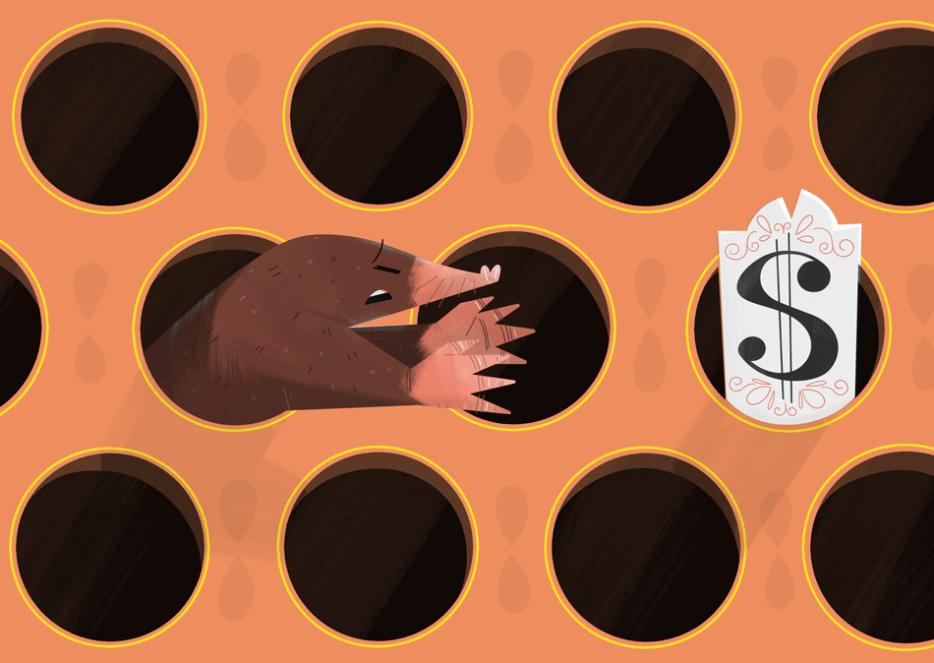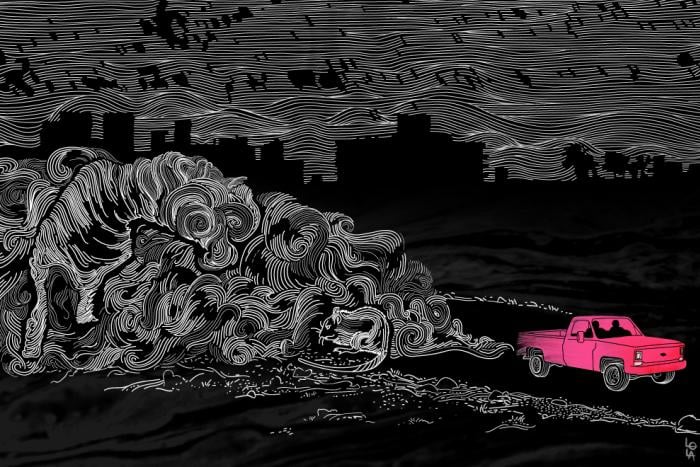Who gets to be a journalist? I do, now, and the fact stuns me. For five years, I worked at a series of marketing companies and non-profits: jobs I wasn’t crazy about, but took because they allowed me to withstand the monthly double-penetration of Toronto rent plus student loan payments. I was trying, and largely failing, to write at night, on weekends, and on my two weeks of holidays per year. I’d bought into that old saw about struggling for one’s craft, as well as the updated version, Malcolm Gladwell’s 10,000 hours rule, but my day jobs paid so little that, more often than not, my free hours had to go to remunerative work—more of the same. This routine produced such a cloud of emotional exhaust that a whole season could pass before I noticed that I hadn’t written a word. Before I went freelance, I was ready to give up.
And then I got money. I didn’t earn it; in fact, it came as a complete surprise, an inheritance from a Depression-era, money-under-the-mattress relative. Not a large sum by most people’s standards, but enough to pay off the remaining balance on my student loans and transition out of the cubicle world. And while I’m relieved, I still can’t shake a feeling of guilt. It’s not that I feel like a cheat—I’ve long realized that money is necessary to launch a creative career. How else does one do an unpaid internship? But the fact that I’ve proved the rule in my profession makes me wonder just what kind of profession it is.
*
This is about more than money; it’s about class. I didn’t always understand this. When I was struggling, I suspected that my failure was due to lack of funds. I’d transcended my blue-collar roots, I thought: I’d been to university; I didn’t work, as my mother might say, “with my hands.” And I blamed myself. I told myself I wasn’t trying hard enough, that I was too impatient. I saw this in my failure to pound out essays after long days at work, and in my weird, jagged career trajectory. I wondered if I was too lazy, too restless to succeed, not cut out for the kind of heels-dug-in effort that creative careers require.
But three months post-money, I don’t feel restless anymore. Cash has changed my perspective as well as my bank balance. I now recognize the fight-or-flight skittishness that ran me through my 20s as the erratic rhythm of poverty—not just poverty as financial fact, but poverty as culture. I was following the money, playing a kind of vocational Whac-A-Mole that is as much a working-class phenomenon as scratch-off lottery tickets; as much a signifier of my class as taking a “gap year” is for others.
My parents went through the same thing. My father worked as a miner, a taxi cab driver, and a contractor, respectively; my mother was, at various times, a waitress, a maid, and a secretary. Poverty doesn’t allow you to develop a linear career trajectory or a coherent professional identity, because when cash is hard to come by, you do whatever job will bring you more of it. But when you apply this short-term logic to a creative field, especially one that requires as much patience and investment and dues-paying as journalism, you come away with nothing.
To be a writer in this market requires not only money, but a concept of “work” that is most easily gained from privilege. It requires a sense of entitlement, the ability to network and self-promote without seeing yourself as an arrogant, schmoozing blowhard. And it requires you to think of working for free—at an internship, say, or on one of those gratis assignments that seem to be everywhere now—as an opportunity rather than an insult or a scam.
This is no longer an industry that rewards working-class values, in other words, and I underestimated how hard it would be to shuck them. It still seems strange to me that people work, unpaid, without a guaranteed job at the end. And I haven’t reconciled myself with the central irony here: that journalism, ostensibly a populist endeavour, is becoming a rarefied practice best suited, both financially and psychologically, to the well-off.
*
It’s difficult to believe now, but journalism wasn’t always an elite pursuit. My grandmother was a journalist; she got her job at the Telegraph with an application and a folder of clips from her college paper. In early high school, I babysat for a columnist who advised me to “keep knocking on doors.” These were people from the era of pounding the pavement, and from them, I got the impression that journalism was a gettable, middle-class job. Why wouldn’t it be? My grandmother wrote about public housing and mortgage rates; a compliment, for her, was to be told that her writing was “relatable.”
I grew up in the late 1980s and early 1990s, which means I spent my formative years under a comet-adorned poster that said “Reach for the Stars!” Still, I didn’t think my goals were stratospheric. I understood that my life would look nothing like the lives of my rich classmates, who were poised for business, medicine, or law—avenues that required connections and expensive professional degrees. Instead, I’d graduate from university, get an entry-level job at a newspaper or magazine, and “work my way up.” The world of newspapers and magazines seemed just the place for a typical working-class kid, strong-headed and mouthy, used to observing things from the outside.
During my years of undergrad—years that were more about juggling waitress jobs than enjoying campus life—I began to hear that journalism was changing, becoming more competitive. But, naive as I was, I thought that meant I’d be OK: as long as I worked hard, I could compete. It wasn’t until a few months after graduation, during a long, fruitless string of informational interviews at Toronto magazines, that I began to understand what “competitive” really meant.
“This is becoming something of a glamour industry,” said one editor, leafing through my clippings behind his cluttered desk. He looked genuinely sorry about it, but that didn’t stop me from hating him as he explained how the internet had eviscerated the field. Entire departments were being laid off, he explained, and entry-level positions were becoming obsolete, or going exclusively to graduates from internship programs. “Which I encourage you to apply for,” he urged, his voice brightening. As if this were a moment of hope.
He went on, but I wasn’t listening anymore. There was no way I could do an unpaid internship. Three months of unpaid work would cost at least $4,000; after a B.A. and a Master’s, my student loan debt already totalled $50,000. My monthly payments were $600, and rent in Toronto would be the same—I was avoiding the latter burden for the time being by living with my mother, but she was a receptionist, and couldn’t reasonably support me for much longer. Plus, there was no way I could ask her to get on board with my taking a job with no salary, especially when it didn’t promise a real position—just a chance to apply for one.
At some point during these desperate calculations, a girl about my age walked into the office and placed a file folder on the editor’s desk. As she left, she glanced back at me and smiled. Was she an intern? Where did she find the money?
I lit a cigarette in the building’s great stone entrance, looked down at my portfolio, and felt, for the first time, embarrassed of it. Although I had felt my debt like a weight as soon as I took it on, it wasn’t until that interview that I saw it for what it was: a gap between me and the life I’d prepared for. I began to realize that debt would drive me harder than ambition, and in a different direction.
Weeks passed. More editors at cluttered desks, more exhortations to apply for internships. Finally, I signed up at an employment agency, hoping that they could find me something for the time being. Amazingly, a job in publishing did come up, but there was a catch: it was at reception.
“I want to make this clear: you will be answering the phones,” said the CEO at my interview. He’d had it up to here, he explained, with eager grads thinking they could work their way up to an editorial position, neglecting the duties they’d been hired for.
I said “Of course,” though privately I was scheming how to work my way into an editorial position. For a while, it actually seemed likely: I handled some overflow editing and did photo research for the production department. But my salary was in the low $20K range—not enough to make my loan payments plus rent. At a liquored-up Christmas party, I got talking to the managing editor, who had been hired following an unpaid internship a few years back. She was two notches above me in the pecking order, possessed a publishing degree, and had been through a few raise cycles. Her salary, she told me, was $28,000. Even if I stayed, working my way up, it would be years before I could even pay rent on a room.
*
When the going gets tough, the terrified apply to grad school. On the computer at my reception desk, I researched the numbers. A Master’s in journalism would cost at least 20K, no exceptions. But there were lots of grants for people studying the humanities. In a PhD program, I could make $25,000, now, and I wouldn’t have to pay back my student loans for four years. In a PhD program, I could rent my own place.
I went to grad school. I rented my own place. On $25K a year, things were tough (I copy-edited e-books in my downtime), but not having to make my monthly loan payment made an incredible difference, as did the cost of rent in London, Ontario: $600 for half of a house, probably a third of what I’d pay in Toronto.
That I explicitly treated my doctoral program as a kind of debtor’s refuge does not mean I didn’t want to be a professor. But the year I graduated, there were just two full-time jobs available in my field (19th-century literature) in North America. I learned that the average wait time for a tenure-track job was five years, during which time one was expected to teach classes on a casual basis. The average part-time professor at my university made $5,000 per course, about $20,000 per year.
The dream of being some sort of writer persisted, even though I knew it was bullshit. It trailed me like a shadow and startled me at banal moments: the middle of a phone conversation, staring out the bus window on my way home from class. I would open a magazine only to seize up with bitterness and regret.
*
When I graduated from my PhD program, I was out of work for six months. I moved back in with my mother. She could help me pay for food, but not much beyond that, so when the hunt for barista jobs failed, I applied for Ontario Works. Here are those working-class values again: talking publically about being on welfare is taboo, and I feel awful discussing this. Still, my discomfort now is nothing compared to the shame I felt trying to explain my situation to a caseworker. I felt like the kid in the fairy tale who, attempting to escape the treacherous forest, takes refuge by accident with the resident witch. The path I thought would lead me out of poverty had delivered me right back into its maw.
With my start-up jobseeker’s fund from Ontario Works, I bought a skirt suit and a Metropass; I applied for all sorts of jobs. Every once in a while, I’d try for a position that sounded editorial-ish, but I wasn’t counting on getting one. In a brief vista of escape, an old contact of mine, the columnist I used to babysit for, recommended me for an internship—a paid internship!—at the Toronto Star. I had worried that I was overqualified, but on the phone, a co-ordinator told me that more and more of their interns had PhDs; unfortunately, I was turning 30 that year, the program’s cut-off age.
Finally, on the merit of those e-books I’d edited during grad school, I found a job editing free magazines for a marketing company. This might sound like a break—I certainly hoped it would be—but in reality, the gig was about as low-paying and dead-end as my receptionist job in publishing had been. How much this job resembled the one I hankered for was a cruel irony: I wrote advertorials that looked like real articles; at junkets, I met people who worked at good papers and magazines, in Xanadus walled off by internships and contacts. They were all nice people, but my encounters with them were gauzy with self-pity and envy. I wondered which of them had interned and how much start-up capital interning had required; what their parents or spouses did; who might have helped them and for how long. In their writing, I thought I caught traces of an easy ascent: the nostalgia for a middle-class childhood, the self-assured tone.
*
I get to write now because I have privilege. I have always been privileged, of course—I am white, able-bodied, and I was born in Canada—but getting to write requires even more privilege than those facts confer. I know I shouldn’t feel bad about my inheritance—It’s equivalent to parental funding, or a relative who knows the boss, or the subtle, psychological advantage that accrues when 3/4 of your brain isn’t always devoted to scheming up the rent. It is the kind of advantage one needs to make it in my industry. Had I not received the money, I would certainly have failed, if only because I would have given up.
I feel grateful to have the privilege to write, but now that I have it, what can I say? I worry that in the transition from poor to comfortable, I’ve lost something crucial: a certain edge, a sense of anger. I fear I’ve lost the qualities that could connect me with readers like my parents, who are struggling in ways I don’t anymore: trying to eat and pay rent, and using the time left over to forget all that trying. If journalists are envoys from a “glamour industry”—if their lives are as removed from the lives of most people as mine has become—how much faith can we place in their accounts?
I suspect that all of this—the unpaid internships, the nepotism, the alarming spread of unpaid assignments—will come to a head soon. As I write this, people are lobbying for laws to protect interns; online, they decry media elitism with mounting intensity. When the current setup falls apart, I hope I will be front and centre to cheer its demise. But the thing about privilege is that the more you have of it, the less you remember it’s there.






